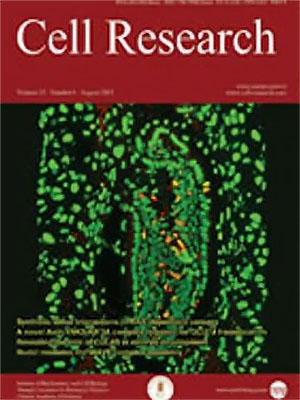
Volume 10, No 1, Mar 2000
ISSN: 1001-0602
EISSN: 1748-7838 2018
impact factor 17.848*
(Clarivate Analytics, 2019)
Volume 10 Issue 1, March 2000: 39-50
ORIGINAL ARTICLES
Isolation and characteristics of autoreactive T cells specific to aggrecan G1 domain from rheumatoid arthritis patients
LI Ning Li1,*, Dong Qing ZHANG1, Kuang Yan ZHOU1, Annie CARTMAN2, Jean Yves LEROUX2, A Robin POOLE2, Yi Ping ZHANG2
1 Shanghai Institute of Immunology, Shagnhai Second Medical University, Shanghai 200025, China
2 Joint Diseases Laboratory, Shriners Hospital, Department of Surgery, McGill University, Montreal, Canada
Correspondence:
Our previous work showed that the cartilage proteoglycan aggrecan could induce an erosive polyarthritis and spondylitis in BALB/c mice and the G1 globular domain of the aggrecan (G1) contained the arthritogenic region. To elucidate whether autoreactive T cells to G1 are expressed in rheumatoid arthritis patients, we analyzed the frequency of human G1-specific T cells in the peripheral blood of five rheumatoid arthritis patients and tried to establish G1-reactive T cell lines from these rheumatoid arthritis patients. The results showed that the G1-specific T cells in PBL were detectable at the range of 4.97
± 0.5
×10
-6in peripheral blood lymphocytes. We have also generated 15 G1-specific T lymphocyte lines from these pateints with a standard split-well method. All these cells expressed fine specificity to human recombinant G1, but not to unrelated antigen. All the 15 lines expressed a pan-T cell marker and 13 of them selectively used the
ab T cell receptor. Two of them used
gd T cell receptor. The 13 of these T cell lines was CD4 positive. One line expressed CD8. One line expressed both CD4 and CD8. Moreover, 14 out of 15 lines expressed the Th-1 cytokine profile, characterized by interferon-
g positivity and IL-4 negativity. No Th-2 type cell line was generated. These data provide strong evidence in favor of the presence of autoreactive T cells in the rheumatoid arthritis pateints. What is the mechanism(s) that these autoreactive T cells attack self-target and whether these G1-specific, Th-1 type T cell lines can induce arthritis in immune deficiency mice are currently under investigation.
FULL TEXT | PDF
Browse 2648


